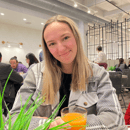Until this past year, I was notorious for getting things wrong in the kitchen. I would obsessively read over a recipe until I was sure I had it down, but I would still undoubtedly manage to skip a step or forget an ingredient. I’ve made more than my fair share of raw-in-the-middle brownies, cookies that didn’t turn out quite right and even black bean burgers that I managed to burn while microwaving them (don’t ask). I thought that I would be forever cursed with the inability to successfully make food, but my relationship with cooking was transformed during quarantine when I realized that I actually have always possessed the ability to cook; I had just been missing five essential ingredients.
- Time
-
The first key ingredient if you’re trying to teach yourself to cook is to leave yourself an ample amount of time. Double the amount of time that a recipe tells you it will take; it’s okay to give yourself more than enough time to create something. The worst thing for your cooking mentality is to make it feel like a chore. This was the case for me in high school when I had sporadically cooked dinner for my family. I felt embarrassed that it took me so long to make a recipe, and it didn’t help that I kept thinking of the hours of homework I wasn’t working on, causing myself even more stress. If my food didn’t turn out how I hoped it would (which was, unfortunately, often), I felt like I had wasted my time. I couldn’t conceive of how people actually enjoyed cooking.
However, when quarantine started and I was sitting around at home with nothing else to do, I decided it would be the perfect time to attempt to cook on a consistent basis and just see what happened. I still had schoolwork looming over me, but it didn’t feel threatening like it had before. Instead, cooking offered me a break from school, a time to take my mind off of my work and create something tangible. If we’re all lucky, we won’t have to endure another five months at home in quarantine ever again. But a global pandemic isn’t necessary in order to make you a good cook; you just have to prioritize spending time in the kitchen.
- A Fresh Perspective
-
In addition to fresh ingredients for your recipes, you also need a fresh perspective if you’re like me and have always previously considered yourself bad at cooking. This time around, I didn’t let myself think that way. Instead, I approached cooking and baking with a new mindset. I didn’t have any grand expectations for myself, but there was no pressure to impress anyone other than my family, who has experienced enough of my cooking fails that they would probably consider anything that wasn’t raw or overcooked a success. At the end of the day, cooking is just reading and following a recipe. Pay close attention to the steps, but don’t overthink everything. Measure the ingredients, but don’t be afraid to eyeball some things. Above all, tell yourself that you’re a good cook. Even if it might not feel true in the moment, you’ll get there with practice. Just telling yourself that you can do it gives you confidence that’s crucial to culinary success.
- Tried and True Recipes
-
It can sometimes feel daunting to make a recipe when you don’t know what the end result is supposed to look or taste like. Similarly, if you decide you want to start cooking regularly, it’s often hard to know what recipes to begin with, especially when you can find just about anything on the internet. Tried and true recipes from family and friends offer the perfect place to start. I made it one of my goals over the summer to collect my favorite family recipes and organize them into a handwritten cookbook so that I would always have them with me in one place, for college and beyond. Some of my favorite family recipes I recreated over the summer were my aunt’s tomato soup, my grandma’s strawberry shortcake biscuits, and a household favorite: rhubarb almond teacake. There’s nothing better than my parents surprising me with my favorite meal when I visit home, but there’s also a sense of pride in possessing the ability to create those meals for myself.
- The Freedom to Experiment
-
In addition to well-loved recipes, once you get a little more comfortable in the kitchen, it’s a lot of fun to explore brand-new meals. Every Saturday morning this summer, my mom and I went to the farmer’s market for fresh fruits and vegetables (and the occasional loaf of Stella’s hot and spicy cheese bread). We also joined a CSA, which presented us with some produce I had never even heard of before, let alone cooked with. The new foods allowed us to experiment with unique meals like pea vine fettuccine or white bean and kale quesadillas with barbecue dip. New recipes are new challenges, and while they might seem intimidating at first, they’ll end up surprising you with how delicious they are.
- Inspiration
-
Last but not least, in order to motivate yourself to start cooking, you’ll probably want some inspiration. I found mine in The Great British Baking Show, which I religiously watched with my dad over the summer. We were so inspired after watching a bread episode that we even tried making our own baguettes—and let me tell you, Paul Hollywood would have been proud. In all honesty though, in order to be good at cooking, I believe that you have to be excited about the prospect of it. Whether that comes from scouring Pinterest boards, watching YouTube meal prep videos, or, like me, watching British people compete for Star Baker, you should find something that makes you want to make food.
I hope these tips helped you gain the courage to try making some recipes, whether they are new favorites or old classics. Don’t be daunted by your inexperience; everyone has to start from somewhere! I’ve found that, when it comes to cooking, faking it till you make it actually works.



